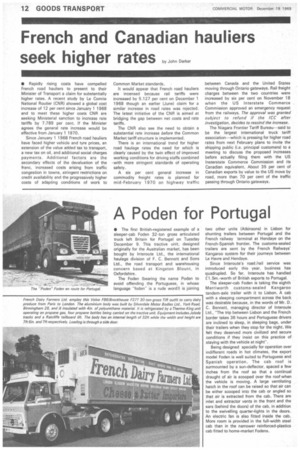French and Canadian hauliers
Page 14

If you've noticed an error in this article please click here to report it so we can fix it.
seek higher rates by John Darker
• Rapidly rising costs have compelled French road hauliers to present to their Minister of Transport a claim for substantially higher rates. A recent study by Le Comite National Routier (CNR) showed a global cost increase of 12 per cent since January 1 1968 and to meet these higher costs CNR are seeking Ministerial sanction to increase rate tariffs by 7,789 per cent. If the Minister agrees the general rate increase would be effective from January 1 1970.
Since January 1 1968 French road hauliers have faced higher vehicle and tyre prices, an extension of the value added tax to transport, a new tax on oil, and additional social charges payments. Additional factors are the secondary effects of the devaluation of the franc, increased costs arising from traffic congestion in towns, stringent restrictions on credit availability and the progressively higher costs of adapting conditions of work to Common Market standards.
it would appear that French road hauliers are incensed because rail tariffs were increased by 5.127 per cent on December 1 1968 though an earlier (June) claim for a similar increase in road rates was rejected. The latest initiative of the CNR is aimed at bridging the gap between net costs and rate tariffs.
The CNR also see the need to obtain a substantial rate increase before the Common Market tariff structure is implemented.
There is an international trend for higher road haulage rates the need for which is clearly caused by the twin effect of improved working conditions for driving staffs combined with more stringent standards of operating safety.
A six per cent general increase in corninodity freight rates is planned for mid-February 1970 on highway traffic between Canada and the United States moving through Ontario gateways. Rail freight charges between the two countries were increased by six per cent on November 18 when the US Interstate Commerce Commission approved an emergency request from the railways. The approval was granted subject to refund if the ICC after investigation, decides to rescind the increase.
The Niagara Frontier Tariff Bureau—said to be the largest international truck tariff association which is pressing for higher road rates from next February plans to invite the shipping public (i.e, principal customers) to a meeting to discuss the proposed increases before actually filing them with the US lnsterstate Commerce Commission and its Canadian equivalent. About 35 per cent of Canadian exports by value to the US move by road, more than 70 per cent of the traffic passing through Ontario gateways.












































































